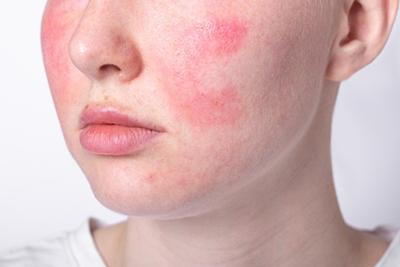
Rosacea is a chronic skin condition causing redness, visible blood vessels, and sometimes bumps on your face. Its exact cause isn't clear, but triggers like sunlight, stress, spicy food, and certain skincare products can exacerbate it. The signs include persistent redness across the cheeks, nose, chin, or forehead, often resembling a blush or sunburn. Small, red, pus-filled bumps might appear, and in some cases, the skin can thicken, especially around the nose, resulting in a condition called rhinophyma.
Consider visiting a dermatologist for persistent facial redness that doesn't subside, bumps that resemble acne but don't clear with typical treatments, or if your skin feels sensitive or stings frequently. Changes in skin texture, like thickening or an enlarged, bulbous nose, are also reasons to seek medical advice. Remember, early diagnosis and management can prevent worsening symptoms.
A dermatologist can provide treatments tailored to your symptoms, such as topical medications, oral antibiotics, laser therapy, or lifestyle changes. Consulting a dermatologist is crucial to manage rosacea effectively and prevent it from affecting your quality of life. If you're experiencing these symptoms, seeking professional help will ensure a proper diagnosis and an appropriate treatment plan.
Rosacea: Understanding Triggers and Effective Treatment Approaches
Rosacea, a chronic skin condition, manifests as redness, visible blood vessels, and sometimes small, red bumps on your face. Understanding triggers can help manage flare-ups. Common triggers include spicy foods, alcohol, temperature changes, stress, and certain skincare products. Identify and avoid these triggers to control symptoms. Protect your skin by using sunscreen daily, as sun exposure aggravates rosacea.
Treatment approaches depend on the subtype and severity of rosacea. For mild cases, gentle skincare is crucial. Select non-abrasive cleansers and moisturizers suitable for sensitive skin. Over-the-counter creams containing azelaic acid or metronidazole can help reduce redness and inflammation.
For moderate to severe cases, dermatologist-prescribed treatments may be necessary. Topical treatments like prescription-strength azelaic acid or oral medications and antibiotics might benefit symptoms. Laser therapy can target visible blood vessels and redness effectively.
Implement lifestyle changes, including stress management techniques like yoga or meditation. Modify your diet, reducing triggers like hot beverages and spicy foods. Consistent skin care and treatment adherence are ideal for managing rosacea effectively. Always consult a healthcare professional to develop a personalized treatment plan that best suits your needs.
How Our Dermatologist Can Help Manage Your Rosacea
Through a comprehensive assessment, a dermatologist tailors treatments to alleviate symptoms. Prescription medications like metronidazole or azelaic acid can target redness and bumps, while laser therapy reduces visible blood vessels. Advice on skincare routines—gentle cleansers, non-irritating products—mitigates flare-ups.
Your dermatologist may suggest lifestyle adjustments, like avoiding triggers - spicy foods or extreme temperatures. Regular follow-ups allow for treatment adjustments, ensuring optimal control over rosacea. By combining medical expertise with personalized care, a dermatologist empowers you to navigate and alleviate the challenges posed by rosacea.
